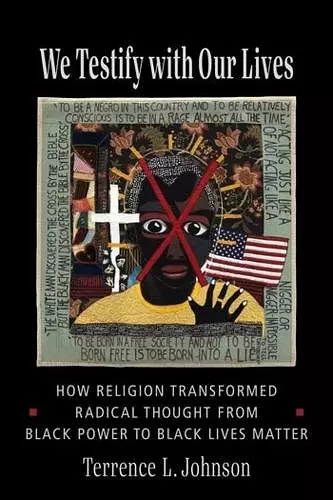We Testify with Our Lives
How Religion Transformed Radical Thought from Black Power to Black Lives Matter
Format:Paperback
Publisher:Columbia University Press
Published:10th Sep '21
Should be back in stock very soon

Police killings of unarmed Black people have ignited a national and international response unlike any in decades. But differing from their civil rights-oriented predecessors, today’s activists do not think that the institutions and values of liberal democracy can eradicate structural racism. They draw instead on a Black radical tradition that, Terrence L. Johnson argues, derives its force from its unacknowledged ethical and religious dimensions.
We Testify with Our Lives traces Black religion’s sustained influence from SNCC to the present, reconstructing a radical lived ethics of freedom and justice. Johnson demonstrates that Black Power fundamentally contests liberalism’s abstract understanding of democracy, calling instead for new embodied frameworks to achieve human flourishing and dignity. Black bodies represent the primary form of resistance against violent and oppressive regimes of white supremacy and exploitation, and the individual and collective struggles of Black life bear witness to the dogged determination to cultivate beauty, rage, and joy.
Considering the writings of Audre Lorde, Toni Cade Bambara, Stokely Carmichael, Martin Luther King Jr., Malcolm X, and James Baldwin, We Testify with Our Lives makes its case through a new narrative of the evolution of Black radicalism from the civil rights movement through the Movement for Black Lives. It forges new insights into Black Power’s vital contributions to debates on ethics, transnational politics, democracy, political solidarity, and freedom—and its potent resources for the ongoing struggle to build democratic possibilities for all.
Terrence L. Johnson draws from the deep wells of African American thought to illuminate the religion of Black politics and the politics of Black religion. We Testify with Our Lives makes a vital contribution to the radical project of multiracial democracy. -- Lawrie Balfour, author of Democracy's Reconstruction: Thinking Politically with W. E. B. Du Bois
Johnson provides an intriguing discussion of a profound ethical turn responsive to the dilemma outlined by Audre Lorde in the 1980s. In so doing, We Testify with Our Lives makes a compelling case for reexamining dynamics of Black religious life and thought, and from that exploration gathering creative and transformative approaches to well-being in all its sociopolitical manifestations. I highly recommend it. -- Anthony B. Pinn, author of Interplay of Things: Religion, Art, and Presence Together
Terrence Johnson's sublime meditations on Black counter-publics take readers from Black women's literary imagination to the Black freedom movement's ethical turn during the rise of Black Power; from the Black Church to Black vernacular reasoning and spiritual intelligence, illustrating how, like Kongo minkisi, they hold and conceal antidotes to Black captivity yet to be discovered. This is a magnificent scholarly intervention—none other than a love letter to Black ancestors, artists, freedom dreamers, activists, homileticians, healers and ritual experts that constructs from their testimonies and creative works a compelling theory of 'sacred subjectivity.' To apprehend Johnson's theoretical arguments readers must be prepared to probe African American letters for narratives of 'sacred subjectivity' and enter the realm of Black interiority where he explores an ethics of 'saltiness' and an ethics of disclosure in Black radical political movements and cultural institutions that heal and provide pathways to wholeness. Black radical traditions of moral reasoning, Johnson argues, invite us to study the brokenness of Black captives and disclose 'sacred subjectivity' as the source of Black repudiation of America's terrifying and irredeemable legacies of liberal democracy. Diving deeper for answers within said movements and institutions, Johnson turns first to elaborating a political spirituality that indeed nurtures a range of political philosophies rooted in Black ethical frameworks rather than liberal democratic ideals that traffic in anti-Blackness. This text is also exemplary for its razor-sharp focus on indigenous Black thought. Through conversations with foundational Black thinkers and movement leaders—Lorde, Fanon, Gordon, Baker, Carmichael, X, Cone, Cannon and others—Johnson identifies overlooked conceptions of humanism in Black radicalism and argues that those who become the 'salt of the earth' have an ethical responsibility to keep company with the 'damned of the earth' and find sonic sanctuary in the cacophony of Black public cries for freedom, breath and wholeness. -- Dianne M. Stewart, author of Black Women, Black Love: America's War on African American Marriage
In this beautifully written book, Terrence L. Johnson masterfully reframes our understanding of Black political thought and moral virtue. Through a gripping narrative that brings us into the presence of ideas in action, Johnson challenges prevailing misconceptions about the Black Power movement and its legacies. This is a groundbreaking book that will command the attention of scholars and students for many years. Essential reading. -- Alex Zamalin, author of Black Utopia: The History of an Idea from Black Nationalism to Afrofuturism
ISBN: 9780231200455
Dimensions: unknown
Weight: unknown
312 pages